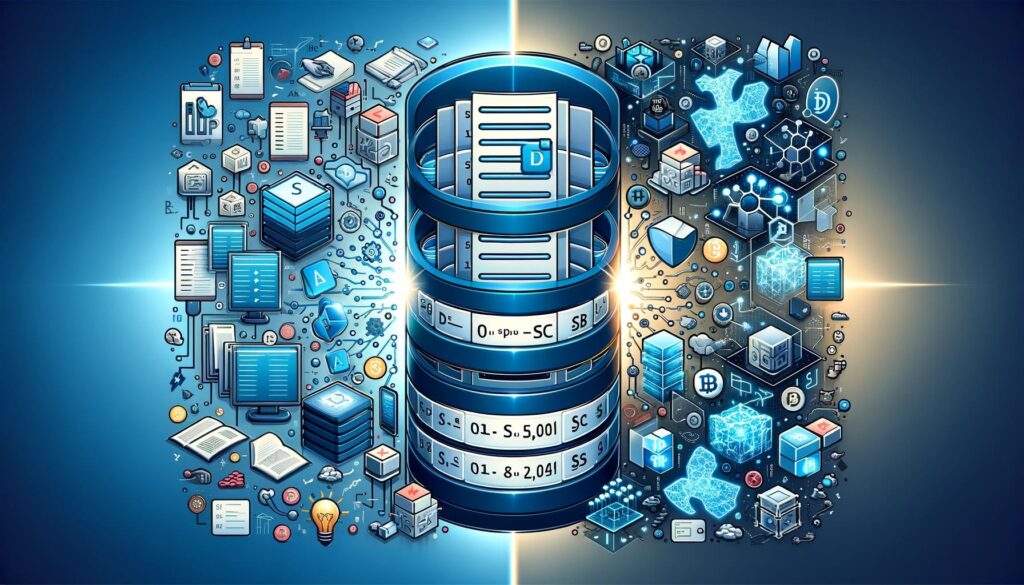In the ever-evolving landscape of technology, the fusion of established and emerging fields often leads to groundbreaking innovations. One such fusion is the integration of Structured Query Language (SQL) with blockchain technology. This article delves into how SQL, a time-tested language for managing and manipulating relational databases, is finding its place in the revolutionary world of blockchain.
A Brief Overview of SQL
SQL has been the cornerstone of data management since its inception in the 1970s. It is a domain-specific language used in programming and designed for managing data held in a relational database management system (RDBMS). SQL’s primary function is to retrieve, insert, update, and delete database records – not just mere data handling, but ensuring data integrity, security, and efficient management.
Introduction to Blockchain Technology
Blockchain, on the other hand, emerged as a ledger technology underpinning cryptocurrencies like Bitcoin. However, its potential extends far beyond just financial transactions. At its core, blockchain is a decentralized, distributed ledger that records transactions across many computers. This decentralization ensures that no single entity has control over the entire chain, making it inherently secure and transparent.
The Intersection of SQL and Blockchain
The intersection of SQL and blockchain is a subject of increasing interest. While blockchain provides a secure and transparent way to store data, SQL offers a well-established, efficient method to query and manage that data. The integration of SQL into blockchain environments aims to leverage the best of both worlds – the robust, tried-and-tested data management capabilities of SQL and the innovative, secure data storage solutions of blockchain.

One might wonder, how does SQL fit into the rigid, append-only structure of a blockchain? The answer lies in the adaptability of SQL. SQL’s ability to query and manage data can be tailored to suit the unique structure of blockchain databases. This includes handling decentralized data, ensuring data integrity, and enabling complex queries across a blockchain’s distributed ledger.
The use of SQL in blockchain opens up possibilities for more complex data structures and queries. For instance, in a blockchain-based supply chain solution, SQL can be used to efficiently query extensive data records for tracking product history, verifying authenticity, and ensuring compliance.
Understanding Blockchain Databases
Blockchain databases represent a significant shift from traditional database structures. Unlike conventional databases that rely on a centralized architecture, blockchain databases are decentralized and distributed across a network of nodes. This unique structure offers enhanced security and transparency but also poses new challenges and opportunities for data management.
How Blockchain Databases Differ from Traditional Databases
The key difference between blockchain and traditional databases lies in their architecture and data integrity mechanisms. In a traditional database, data is stored in a centralized server, and SQL is used to manage this data effectively. However, in a blockchain database, the data is stored across a network of computers, each holding a copy of the ledger. This means that any change in the ledger is reflected across all copies, making data tampering extremely difficult.
Another significant difference is in how data is added. In blockchain, data is grouped into blocks, and each block is chained to the previous one, creating a chronological and unalterable sequence. This contrasts with traditional databases, where data can be modified or deleted.
Role of SQL in Managing Blockchain Data
Integrating SQL into blockchain databases allows for familiar and efficient data querying and management. SQL can be used to query blockchain data, enabling users to extract meaningful information from the vast, decentralized ledger. For example, in a blockchain-based supply chain, SQL can be used to track the journey of a product from manufacturer to end consumer.

PHP Code Example for SQL and Blockchain Interaction
Consider a scenario where you’re using a PHP application to interact with a blockchain database. The PHP script can use SQL queries to retrieve data from the blockchain. Here’s a simplified example:
<?php
// Assuming a blockchain database connection is established
// SQL query to retrieve data from the blockchain
$query = "SELECT * FROM blockchain_table WHERE product_id = '12345'";
// Execute the query
$result = $blockchainDatabase->query($query);
// Fetch and display the results
while ($row = $result->fetch_assoc()) {
echo "Product ID: " . $row["product_id"] . "\n";
echo "Transaction Hash: " . $row["transaction_hash"] . "\n";
echo "Timestamp: " . $row["timestamp"] . "\n";
// Additional code to process the data
}
?>
In this example, the PHP script uses an SQL query to retrieve information about a specific product from a blockchain database. The script connects to the database, executes the query, and processes the results.
This integration of SQL into blockchain technology not only makes blockchain databases more accessible to those familiar with SQL but also opens up new possibilities for complex data analysis and management in decentralized environments. As we explore further, we’ll see how SQL queries are adapted for blockchain environments and the role they play in enhancing blockchain security and functionality.
SQL Queries in Blockchain Environments
Adapting SQL queries for blockchain environments involves understanding the unique structure and requirements of blockchain databases. Unlike traditional databases, where data is often mutable and centralized, blockchain databases store immutable data across a distributed network. This requires a tailored approach to SQL query design and execution.
Adapting SQL Queries for Blockchain Data Structures
In a blockchain environment, SQL queries must account for the immutable and append-only nature of the data. For instance, UPDATE and DELETE operations, common in traditional SQL, are not applicable in the same way for blockchain databases. Instead, SQL queries in blockchain focus more on data retrieval and analysis.
Here’s an example of how a PHP script might execute an SQL query in a blockchain environment:
<?php
// Assuming a connection to a blockchain database
// SQL query to retrieve transaction details
$query = "SELECT transaction_id, sender_address, receiver_address, amount FROM blockchain_transactions WHERE date >= '2023-01-01'";
// Execute the query
$result = $blockchainDatabase->query($query);
// Display the results
while ($row = $result->fetch_assoc()) {
echo "Transaction ID: " . $row["transaction_id"] . "\n";
echo "Sender: " . $row["sender_address"] . "\n";
echo "Receiver: " . $row["receiver_address"] . "\n";
echo "Amount: " . $row["amount"] . "\n";
}
?>
In this PHP script, the SQL query is designed to retrieve transaction details from a blockchain database. The focus is on extracting specific information based on a set criterion (e.g., transactions from a certain date).
Examples of SQL Queries in Blockchain
SQL queries in blockchain can be quite diverse, depending on the application. For instance, in a blockchain-based voting system, an SQL query might be used to count votes, ensuring transparency and accuracy. In a financial blockchain application, SQL can help in analyzing transaction patterns and detecting anomalies.
Here’s a simple example of an SQL query in a blockchain-based voting system:
SELECT candidate, COUNT(*) as vote_count
FROM blockchain_votes
GROUP BY candidate
ORDER BY vote_count DESC;
This query would help in aggregating votes for each candidate, showcasing SQL’s ability to efficiently process and analyze data within a blockchain environment.
The use of SQL in blockchain environments demonstrates the versatility and adaptability of SQL as a language. It shows that even in the context of innovative technologies like blockchain, established tools like SQL can play a crucial role in data management and analysis. The next section will explore how SQL enhances blockchain security, particularly in terms of data validation and integrity.
Enhancing Blockchain Security with SQL
SQL’s role in blockchain technology extends beyond data management to enhancing security, particularly in data validation and integrity. In blockchain, maintaining data integrity is crucial, as it ensures the ledger’s accuracy and trustworthiness. SQL contributes to this by enabling efficient and accurate data validation processes.
SQL’s Role in Data Validation and Integrity in Blockchain
In a blockchain environment, every transaction or data entry is critical, as each block is linked to the previous one, forming an unbreakable chain. SQL can be used to validate data before it’s added to the blockchain, ensuring that only accurate and verified information is recorded. This is particularly important in applications like financial transactions, where accuracy is paramount.
For example, SQL can be used to check the validity of transactions by verifying account balances, transaction amounts, and the authenticity of transaction parties. This helps in preventing fraudulent activities and maintaining the integrity of the blockchain.
Preventing Blockchain Vulnerabilities through SQL
SQL can also play a role in identifying and addressing potential vulnerabilities in a blockchain network. By analyzing transaction patterns and user behaviors, SQL queries can help in detecting anomalies that might indicate security threats, such as unusual transaction volumes or patterns that deviate from the norm.
Here’s an example of how a PHP script might use SQL to analyze transaction patterns for security purposes:
<?php
// Connection to blockchain database is assumed
// SQL query to detect unusual transaction volumes
$query = "SELECT sender_address, SUM(amount) as total_sent
FROM blockchain_transactions
WHERE date = CURDATE()
GROUP BY sender_address
HAVING total_sent > 100000;"; // Arbitrary threshold for unusual activity
// Execute the query
$result = $blockchainDatabase->query($query);
// Analyze the results
while ($row = $result->fetch_assoc()) {
// Code to flag or investigate the transaction further
echo "High Volume Alert: " . $row["sender_address"] . " sent a total of " . $row["total_sent"] . "\n";
}
?>
In this PHP script, the SQL query is designed to identify any sender addresses that have transacted a total amount exceeding a certain threshold on the current day. This could be an indicator of unusual activity, warranting further investigation.
Through such mechanisms, SQL not only contributes to the efficient management of blockchain data but also plays a crucial role in safeguarding the integrity and security of blockchain networks. The next sections will explore SQL’s application in specific blockchain functionalities like smart contracts and transactions, and how it contributes to real-world blockchain applications.
SQL in Smart Contracts and Transactions
SQL’s versatility allows it to play a significant role in the development and management of smart contracts and transactions within blockchain technology. Smart contracts are self-executing contracts with the terms of the agreement directly written into code. They are a key feature in many blockchain applications, automating processes and ensuring compliance with predefined rules.
Utilizing SQL for Smart Contract Development
In the context of smart contracts, SQL can be used to define and enforce the rules and conditions of these contracts. For instance, SQL queries can be employed to trigger certain actions when predefined conditions are met, such as releasing funds when a product is delivered.
Here’s a conceptual example of how SQL might be used in a smart contract scenario:
<?php
// Assuming a connection to a blockchain that supports smart contracts
// SQL query to check if conditions for contract execution are met
$query = "SELECT contract_id FROM smart_contracts WHERE contract_conditions_met()";
// Execute the query
$result = $blockchainDatabase->query($query);
// Process the results
while ($row = $result->fetch_assoc()) {
// Code to execute the smart contract
executeSmartContract($row["contract_id"]);
}
?>
In this PHP script, the SQL query checks for smart contracts whose conditions have been met. The contract_conditions_met() function represents a hypothetical SQL function that evaluates the conditions of each contract.
Managing Blockchain Transactions with SQL
SQL is also instrumental in managing blockchain transactions. It can be used to query transaction histories, verify transaction details, and ensure that transactions comply with blockchain protocols.
For example, a PHP script might use SQL to retrieve and display a user’s transaction history:
<?php
// Connection to the blockchain database
$userAddress = 'user_wallet_address'; // Example user address
// SQL query to retrieve transaction history
$query = "SELECT * FROM blockchain_transactions WHERE sender_address = '$userAddress' OR receiver_address = '$userAddress'";
// Execute the query
$result = $blockchainDatabase->query($query);
// Display the transaction history
while ($row = $result->fetch_assoc()) {
echo "Transaction ID: " . $row["transaction_id"] . "\n";
echo "Sender: " . $row["sender_address"] . "\n";
echo "Receiver: " . $row["receiver_address"] . "\n";
echo "Amount: " . $row["amount"] . "\n";
echo "Date: " . $row["date"] . "\n";
}
?>
In this script, the SQL query retrieves all transactions where the user is either the sender or the receiver. This allows the user to view their entire transaction history on the blockchain.
SQL’s integration into smart contracts and transaction management showcases its adaptability and effectiveness in diverse applications within blockchain technology. The next sections will delve into real-world examples of SQL in blockchain applications, highlighting its practical impact and the lessons learned from these applications.
Conclusion
As we’ve explored, the integration of SQL into blockchain technology is not just a merging of old and new but a synergistic relationship that enhances both fields. SQL brings its robust data management capabilities to the inherently secure and transparent nature of blockchain. This combination is already showing its potential in various applications, from supply chain management to voting systems, and is set to expand further with emerging trends like IoT and AI integration. The adaptability of SQL in handling blockchain’s unique data structures and requirements underscores its enduring relevance. As blockchain technology continues to evolve, the role of SQL in ensuring data integrity, enhancing security, and improving scalability becomes increasingly significant. This partnership between SQL and blockchain is paving the way for more efficient, secure, and innovative data management solutions in our increasingly digital world.




